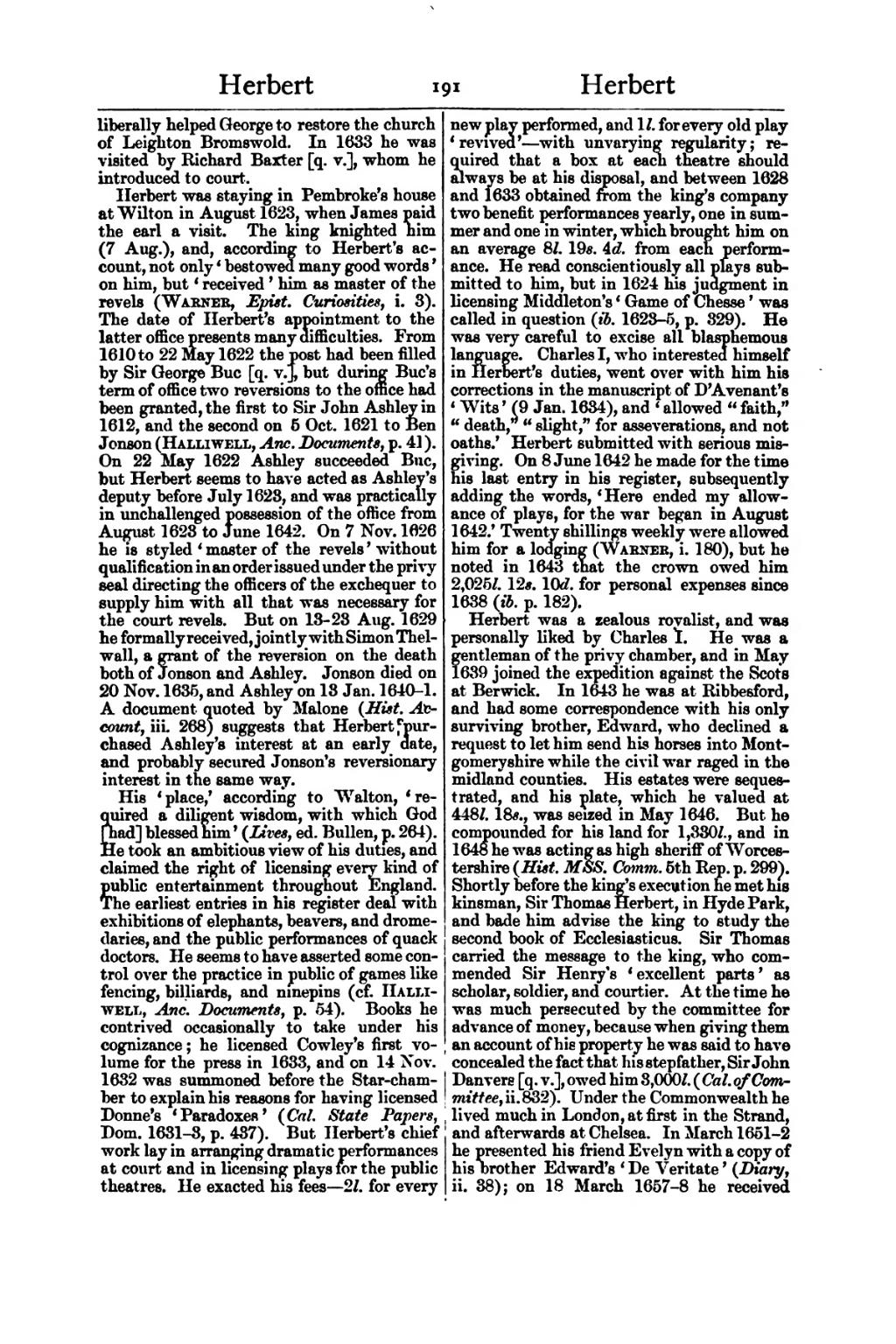liberally helped George to restore the church of Leighton Bromswold. In 1633 he was visited by Richard Baxter [q. v.], whom he introduced to court.
Herbert was staying in Pembroke's house at Wilton in August 1623, when James paid the earl a visit. The king knighted him (7 Aug.), and, according to Herbert's account, not only ‘bestowed many good words’ on him, but ‘received’ him as master of the revels (Warner, Epist. Curiosities, i. 3). The date of Herbert's appointment to the latter office presents many difficulties. From 1610 to 22 May 1622 the post had been filled by Sir George Buc [q. v.], but during Buc's term of office two reversions to the office had been granted, the first to Sir John Ashley in 1612, and the second on 5 Oct. 1621 to Ben Jonson (Halliwell, Anc. Documents, p. 41). On 22 May 1622 Ashley succeeded Buc, but Herbert seems to have acted as Ashley's deputy before July 1623, and was practically in unchallenged possession of the office from August 1623 to June 1642. On 7 Nov. 1626 he is styled ‘master of the revels’ without qualification in an order issued under the privy seal directing the officers of the exchequer to supply him with all that was necessary for the court revels. But on 13-23 Aug. 1629 he formally received, jointly with Simon Thelwall, a grant of the reversion on the death both of Jonson and Ashley. Jonson died on 20 Nov. 1635, and Ashley on 13 Jan. 1640-1. A document quoted by Malone (Hist. Account, iii. 268) suggests that Herbert purchased Ashley's interest at an early date, and probably secured Jonson's reversionary interest in the same way.
His ‘place,’ according to Walton, ‘required a diligent wisdom, with which God [had] blessed him’ (Lives, ed. Bullen, p. 264). He took an ambitious view of his duties, and claimed the right of licensing every kind of public entertainment throughout England. The earliest entries in his register deal with exhibitions of elephants, beavers, and dromedaries, and the public performances of quack doctors. He seems to have asserted some control over the practice in public of games like fencing, billiards, and ninepins (cf. Halliwell, Anc. Documents, p. 54). Books he contrived occasionally to take under his cognizance; he licensed Cowley's first volume for the press in 1633, and on 14 Nov. 1632 was summoned before the Star-chamber to explain his reasons for having licensed Donne's ‘Paradoxes’ (Cal. State Papers, Dom. 1631-3, p. 437). But Herbert's chief work lay in arranging dramatic performances at court and in licensing plays for the public theatres. He exacted his fees—2l. for every new play performed, and M. for every old play ‘revived’—with unvarying regularity; required that a box at each theatre should always be at his disposal, and between 1628 and 1633 obtained from the king's company two benefit performances yearly, one in summer and one in winter, which brought him on an average 8l. 19s. 4d. from each performance. He read conscientiously all plays submitted to him, but in 1624 his judgment in licensing Middleton's ‘Game of Chesse’ was called in question (ib. 1623-5, p. 329). He was very careful to excise all blasphemous language. Charles I, who interested himself in Herbert's duties, went over with him his corrections in the manuscript of D'Avenant's ‘Wits’ (9 Jan. 1634), and ‘allowed “faith,” “death,” “slight,” for asseverations, and not oaths.’ Herbert submitted with serious misgiving. On 8 June 1642 he made for the time his last entry in his register, subsequently adding the words, ‘Here ended my allowance of plays, for the war began in August 1642.’ Twenty shillings weekly were allowed him for a lodging (Warner, i. 180), but he noted in 1643 that the crown owed him 2,025l. 12s. l0d. for personal expenses since 1638 (ib. p. 182).
Herbert was a zealous royalist, and was personally liked by Charles I. He was a gentleman of the privy chamber, and in May 1639 joined the expedition against the Scots at Berwick. In 1643 he was at Ribbesford, and had some correspondence with his only surviving brother, Edward, who declined a request to let him send his horses into Montgomeryshire while the civil war raged in the midland counties. His estates were sequestrated, and his plate, which he valued at 448l. 18s., was seized in May 1646. But he compounded for his land for 1,330l., and in 1648 he was acting as high sheriff of Worcestershire (Hist. MSS. Comm. 5th Rep. p. 299). Shortly before the king's execution he met his kinsman, Sir Thomas Herbert, in Hyde Park, and bade him advise the king to study the second book of Ecclesiasticus. Sir Thomas carried the message to the king, who commended Sir Henry's ‘excellent parts’ as scholar, soldier, and courtier. At the time he was much persecuted by the committee for advance of money, because when giving them an account of his property he was said to have concealed the fact that his stepfather, Sir John Danvers [q. v.],owed him 3,000l Cal. of Committee, ii. 832). Under the Commonwealth he lived much in London, at first in the Strand, and afterwards at Chelsea. In March 1651-2 he presented his friend Evelyn with a copy of his brother Edward's ‘De Veritate’ (Diary, ii. 38); on 18 March 1657-8 he received
